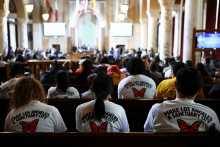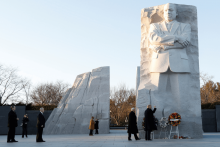Opinion

What does it look like for churches to act faithfully in the current tumultuous political crisis? Prophetic witness and speaking up for justice matters; acting faithfully goes hand in hand with speaking faithfully. Whatever policy priorities churches focus on, they should always look to go deeper into solidarity with those in need in their communities — especially marginalized people who are in danger due to unjust government actions.
Solidarity isn’t affection. Solidarity is, instead, a recognition that our destinies are intertwined because of our common humanity. As Martin Luther King, Jr. wrote in his 1963 “Letter from Birmingham Jail,” “We are caught in an inescapable network of mutuality, tied in a single garment of destiny.”

In the halls of empire, men sit at gleaming tables untouched by war, they speak of peace as though it is theirs to grant. But they have never gathered their children into one room to sleep at night so that if death comes, it takes them together. They have never watched the sky split open with fire, felt the air convulse after the blast, felt the wind howl past — hot, violent, and thick with the dust and scent of obliteration. And yet, they sign their names to ceasefires, shake hands, and expect the world to applaud. They do not blush as they bankroll the demolition of homes, the bombing of hospitals, and the erasure of entire families .
During the first week of February, U.S. President Donald Trump hosted Israeli Prime Minister Benjamin Netanyahu, whois the subject of an International Criminal Court arrest warrant for committing war crimes and crimes against humanity. This meeting took place as the fragile ceasefire agreement between the Israeli occupying forces and the Palestinian militant group, Hamas, hung in the balance. Trump, never one to concern himself with the nuances of international law (or any law, really), originally floated the idea of the U.S. “owning Gaza” on Feb. 4 and then has since doubled down on this colonial fantasy, one so crude and reckless that his own administration scrambled to downplay it.

Even while wrestling with lament, I’ve wanted to move toward contributing to addressing injustice to counter the pervasive injustice that occupies so much of our news. But I’ve just not known how. I’ve felt that nothing in my sphere of direct influence is grand enough to move any kind of needle.
But being a faithful follower of Christ is, in fact, less about giving a virtuoso solo performance and more often playing a small part in a great work we cannot fully comprehend.

Autocracies begin at the ballot box. Donald Trump is the legitimately elected president of the United States who, in his first weeks in office, has used illegitimate and illegal actions to solidify his power. He has brazenly declared, “He who saves his country does not violate any Law.”
But while he is the first U.S. president to display such public contempt for the structures, institutions, and civil servants he has been elected to lead, his tactics aren’t unique.

Amid the fragile ceasefire, the exchange of hostages, and the temporary pause in Israel’s genocidal onslaught against Gazans, nearly six hundred Christians huddle together in one of Gaza’s battered churches, their prayers rising above the rubble as a defiant testament to their faith and resilience. Among them, Gazan Christian George Antone boldly declares, “For us, as Christians, we are not leaving Gaza. We will remain in Gaza and help people in Gaza reconstruct their houses, rebuild the streets. Yes, we will stay in Gaza. We are not leaving.”
Antone’s words stand in stark contrast to the explosive press conference at the White House on Feb. 4, when President Donald Trump brazenly suggested that the United States should “effectively own” Gaza, proposing to turn it into a real estate venture while displacing Palestinians from their homeland and relocating them to neighboring countries.

In June 2023, Metropolitan AME successfully sued the Proud Boys, winning a $2.8 million judgment through default judgement for trespassing and vandalizing our property. But because they have yet to pay, our church creatively sought to ensure payment by stripping the hate group of its trademark, meaning they can no longer sell merchandise to fund their hate — unless our church allows it. Any profits the Proud Boys earn from using the trademark must be paid to Metropolitan to help fulfill the multi-million-dollar default judgment.

In the weeks leading up to the inauguration, Sojourners’ 41st class of fellows gathered to study bell hooks’ prophetic book All About Love . In her writing, hooks not only exposes the structures underpinning systems of oppression but illuminates paths toward dismantling them. Her primary tactic is one we don’t hear much about these days: love.
Published in 1999, All About Love could just as easily have been written amid today’s political upheaval. Hooks calls out fear as a defining issue of our time: “As a culture we are obsessed with the notion of safety. Yet we do not question why we live in states of extreme anxiety and dread. Fear is the primary force upholding structures of domination.”

I’ve been caring for the dying since I was 22 years old. Before the rise in death doula work, I was a caregiver for my mother, who died of primary peritoneal carcinoma at 58 –years old. I sat with her during her chemotherapy appointments. I took notes at appointments with doctors. I created a rapport with her medical team so that I could be in the best position to advocate for her up until the very end.

The fight to save the planet isn't over yet, but it will look different under Trump. Can Christians lead the charge?

With Trump’s blessing, Elon Musk’s Department of Government Efficiency has created an unprecedented crisis at an agency that oversees lifesaving assistance to some of the poorest and most vulnerable people in the world. Despite issuing limited humanitarian waivers, the administration has frozen nearly all new foreign assistance funding for the next 90 days, fired many senior leaders, and put the entire agency’s staff of more than 10,000 people on leave, two-thirds of whom work in field locations around the world.

This January, Trump was once again sworn in as president of the United States, propelled to office by the unwavering support of countless evangelical Christians.
For me, the results of the 2024 presidential election felt like the punchline to an incredibly cruel joke. I grew up in the church and still remember the lessons taught to me by my old mentors. I was told that following Jesus meant that truth mattered, justice mattered, how I treated women mattered, and how I treated my neighbor mattered. Later, when I came out as a gay man, my Christian peers insisted that I put aside my personal feelings and desires in the name of biblical fidelity. I spent years of my life making painful and irreversible sacrifices in order to do what I thought was right at the time. Then Trump came along, and suddenly the narrative changed — truth was pliable, character was irrelevant, and justice was getting in the way of “winning.”

In an interview with Fox News, Vice President JD Vance claimed that the old Christian teaching of "ordo amoris" justifies the Trump Administration's treatment of immigrants. But a closer look at the writings of Augustine show that "ordo amoris" doesn't mean what Vance claims it does. In fact, it teaches almost the exact opposite.

Trump's barrage of executive orders, policy decisions and campaign appointments is overwhelming in its extremism. It is designed to provoke a feeling of panicked helplessness among those who oppose his plans for immigrants, LGBTQ+ people, and other targets of his vision for our country. But we do not have to give Trump what he wants and, by staying rooted in our faith, can undermine his campaign of shock and awe.

Democratic Party leadership presented the 2024 presidential election as a choice between Donald Trump and democracy. That messaging seemed not to resonate with the majority of voters as Trump is now president. Despite his extreme policy stances, Trump captured nearly two-thirds of the Christian vote. Trump and his ilk will accelerate the nation’s lurch toward authoritarianism, Christian nationalism, and fewer rights for already marginalized communities. The campaign promises of then-candidate Trump — many of them already being enacted — will devastate millions.

Progressive churches or worship communities often present as accepting places — displaying LGBTQ+ flags or signs on their property or preaching messages that emphasize accepting and affirming LGBTQ+ people. Those are good places to start. But as the U.S. government escalates its discrimination against trans people, it is also necessary that religious communities escalate their support of the trans community. For communities that want to stand in solidarity with trans people, here are five additional action steps that you and your religious community can take.

In this anxious moment, I find it helpful to remember a similar era from the late 19th century, a time when Chinese migrants, under threat of mass deportation, collectively resisted with one of the greatest instances of civil disobedience in U.S. history. Following the passage of the 1892 Geary Act, which continued barring Chinese laborer migration and required all Chinese residents to register as aliens, about 90,000 Chinese — roughly 9 out of 10 Chinese in the U.S. at the time — defied unjust government orders to protest their racial treatment.

As we enter a second Donald Trump presidency, the stakes could not be higher for undocumented people and asylum seekers in this country. Having promised mass deportations to a degree never attempted in the United States, President-elect Trump’s new border czar, Tom Homan, has signaled that the administration’s cruelty will begin in my backyard — Chicago. What he might not be counting on is organized resistance from labor, faith, and immigration leaders that will attempt to thwart these plans.

The juxtaposition is hard to ignore: President-elect Donald Trump, who launched his political career by questioning — without evidence — the citizenship of our country’s first Black president, will take his second oath of office on the day we remember and honor Rev. Martin Luther King Jr., this country’s greatest champion for civil and human rights. Though I hope and pray Trump’s second term will follow the moral vision we honor every year on King’s birthday, I fear the dream King cast for America is much more akin to Trump’s nightmare.

Since his death, Carter’s remarkable life and numerous accomplishments have been rightly celebrated, including the Camp David Accords, a historic nuclear weapons treaty, major environmental protection legislation, the release of political prisoners, the near-eradication of the Guinea worm, aid in conducting free and fair elections in dozens of countries around the world, and decades of volunteer service with Habitat for Humanity. But despite this impressive legacy, what most inspires me about Carter was how he applied his faith to the messiness of politics, both during his time in the White House and in his many years after — a model that we desperately need today in our increasingly polarized and vitriolic politics.

Awareness months, weeks, and days are the kind of thing that often feel manufactured to get us to buy things: It’s Black History Month in February, so buy anti-racist books or something; it’s Stress Awareness Month in April, so invest in yourself and sign up for a mindfulness meditation class; May 6-12 is National Nurses Week, so buy some stuff and send it to a local hospital. These are all fine things to do, but is that all there is to this? Are awareness months just an excuse to throw some money at a cause? Is it just a convenient hook for journalists to write an article about a certain cause or group of people?